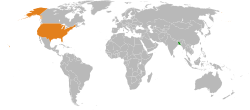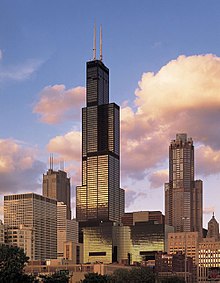
Agha Muhammad Yahya Khan was a Pakistani military officer, who served as the third president of Pakistan from 1969 to 1971. He also served as the Commander-in-Chief of the Pakistan Army from 1966 to 1971. Along with Tikka Khan, he was considered the chief architect of the 1971 Bangladesh genocide.

The foreign relations of Bangladesh are Bangladesh's relationships with foreign countries. The Government of Bangladesh's policies pursue a moderate foreign policy that heavily relies on multilateral diplomacy, especially at the United Nations (UN) and the World Trade Organization (WTO). Since its independence in 1971, Bangladesh has stressed its principle of "Friendship towards all, malice towards none" in dictating its diplomacy. As a member of the Non-Aligned Movement, Bangladesh has tended to not take sides with major powers. Since the end of the Cold War, Bangladesh has pursued better relations with its neighbours and other nearby states.

The Indo-Pakistani war of 1971, also known as the third India-Pakistan war, was a military confrontation between India and Pakistan that occurred during the Bangladesh Liberation War in East Pakistan from 3 December 1971 until the Pakistani capitulation in Dhaka on 16 December 1971. The war began with Pakistan's Operation Chengiz Khan, consisting of preemptive aerial strikes on eight Indian air stations. The strikes led to India declaring war on Pakistan, marking their entry into the war for East Pakistan's independence, on the side of Bengali nationalist forces. India's entry expanded the existing conflict with Indian and Pakistani forces engaging on both the eastern and western fronts. Thirteen days after the war started, India achieved a clear upper hand, and the Eastern Command of the Pakistan military signed the instrument of surrender on 16 December 1971 in Dhaka, marking the formation of East Pakistan as the new nation of Bangladesh. Approximately 93,000 Pakistani servicemen were taken prisoner by the Indian Army, which included 79,676 to 81,000 uniformed personnel of the Pakistan Armed Forces, including some Bengali soldiers who had remained loyal to Pakistan. The remaining 10,324 to 12,500 prisoners were civilians, either family members of the military personnel or collaborators (Razakars).

The Bangladesh Liberation War, also known as the Bangladesh War of Independence, or simply the Liberation War in Bangladesh, was a revolution and armed conflict sparked by the rise of the Bengali nationalist and self-determination movement in East Pakistan, which resulted in the independence of Bangladesh. The war began when the Pakistani military junta based in West Pakistan—under the orders of Yahya Khan—launched Operation Searchlight against the people of East Pakistan on the night of 25 March 1971, initiating the Bangladesh genocide.
Archer Kent Blood was an American career diplomat and academic. He served as the last American Consul General to Dhaka, Bangladesh. He is famous for sending the strongly worded "Blood Telegram" protesting against the atrocities committed in the Bangladesh Liberation War. He also served in Greece, Algeria, Germany, Afghanistan and ended his career as chargé d'affaires of the U.S. Embassy in New Delhi, India, retiring in 1982.
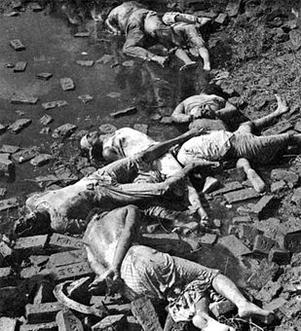
The Bangladesh genocide was the ethnic cleansing of Bengalis, especially Bengali Hindus, residing in East Pakistan during the Bangladesh Liberation War, perpetrated by the Pakistan Armed Forces and the Razakars. It began on 25 March 1971, as Operation Searchlight was launched by West Pakistan to militarily subdue the Bengali population of East Pakistan; the Bengalis comprised the demographic majority and had been calling for independence from the Pakistani state. Seeking to curtail the Bengali self-determination movement, erstwhile Pakistani president Yahya Khan approved a large-scale military deployment, and in the nine-month-long conflict that ensued, Pakistani soldiers and local pro-Pakistan militias killed between 300,000 and 3,000,000 Bengalis and raped between 200,000 and 400,000 Bengali women in a systematic campaign of mass murder and genocidal sexual violence. In their investigation of the genocide, the Geneva-based International Commission of Jurists concluded that Pakistan's campaign involved the attempt to exterminate or forcibly remove a significant portion of the country's Hindu populace.

Bangladesh–Iran relations are the bilateral relations between Bangladesh and Iran. Despite not having any major deals or any big kind of trade, the representatives of both nations have called for expanding economic relations between the two countries. Both are members of the OIC and the Developing 8.

The Indo–Soviet Treaty of Peace, Friendship and Cooperation was a treaty signed between India and the Soviet Union in August 1971 that specified mutual strategic cooperation. This was a significant deviation from India's previous position of non-alignment during the Cold War and was a factor in the 1971 Indo-Pakistani war.

Bangladesh–Russia relations are the foreign relations between Bangladesh and Russia. Russia has an embassy in Dhaka and a consulate-general in Chittagong, while Bangladesh has an embassy in Moscow. Diplomatic relations between the USSR and Bangladesh were established on January 25, 1972. These relations have continued with Russia being the successor state to the Soviet Union.
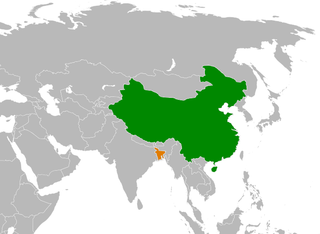
Bangladesh–China relations are the bilateral relations of Bangladesh and China. China has an embassy in Dhaka and Bangladesh has one in Beijing and consulates in Hong Kong and Kunming. Both countries are members of the BCIM Forum. According to Chinese government designations, Bangladesh and China are in a "strategic partnership of cooperation".

The independence of Bangladesh was declared on 26 March 1971, at the onset of the Bangladesh Liberation War by Bangabandhu Sheikh Mujibur Rahman; the following day the declaration was broadcast by Major Ziaur Rahman from Swadhin Bangla Betar Kendra radio station in kalurghat, Chattogram. On 10 April, the Provisional Government of Bangladesh issued a proclamation on the basis of the previous declaration and established an interim constitution for the independence movement.
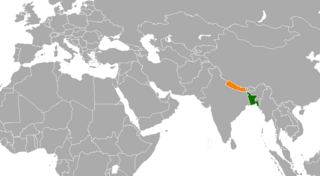
The bilateral relations between the People's Republic of Bangladesh and the Federal Democratic Republic of Nepal have been progressive since the foundation of Bangladesh in 1971. The two nations are separated by the "Siliguri Corridor" - a 22 kilometres (14 mi) wide stretch of territory of the Indian state of West Bengal lies between southern Nepal and northern Bangladesh. Both South Asian nations are members of the South Asian Association for Regional Cooperation (SAARC) and Bay of Bengal Initiative for MultiSectoral Technical and Economic Cooperation (BIMSTEC).
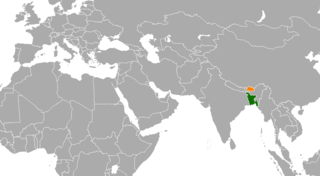
Bangladesh–Bhutan relations are the bilateral relations between Bangladesh and Bhutan. The King of Bhutan was the first world leader to announce official recognition of Bangladesh's independence on 6 December 1971. The leadership of both countries have since exchanged many state visits. In 2016, the President of Bangladesh addressed the Parliament of Bhutan. On 6 December 2020, both countries signed a Preferential Trade Agreement (PTA) with provisions for free trade in certain goods. The signing of the PTA was witnessed by the Prime Minister of Bangladesh and the Prime Minister of Bhutan.

Bangladesh and Indonesia established diplomatic relations in 1971. Indonesia is the world's largest Muslim country, whereas Bangladesh is the world's fourth largest Muslim country. They are partners in the United Nations and various multilateral organisations, particularly in international peacekeeping, the Developing 8 Countries, the Non-Aligned Movement, the World Trade Organization and the Organisation of Islamic Cooperation. Bangladesh has an embassy in Jakarta, and Indonesia has one in Dhaka. Official diplomatic relations were established in 1972 after Indonesia became one of the first Muslim countries to recognise independent Bangladesh.

Bangladesh–Mexico relations are the bilateral relations between Bangladesh and Mexico. Both nations are members of the United Nations and the World Trade Organization.
The Bangladesh Liberation War was a revolutionary independence war that took place in South Asia in 1971; this event resulted in the establishment of the republic of Bangladesh. The war pitted East Pakistan against West Pakistan and lasted over a duration of nine months. It witnessed large-scale atrocities, the exodus of 10 million refugees and the indiscriminate killing of 100,000 to 300,000 people from both sides.

The Embassy of the United States of America in Dhaka is the diplomatic mission of the United States in Bangladesh. It is located in Baridhara. The embassy has 400 staff led by the US Ambassador to Bangladesh.

Bangladesh–Jordan relations refer to the bilateral relations between Bangladesh and Jordan. Both countries are members of the Non-Aligned Movement and the Organisation of Islamic Cooperation.

Genocide Remembrance Day is a national day of remembrance in Bangladesh observed on 25 March in commemoration of the victims of the Bangladesh genocide during the Bangladesh Liberation War in 1971.

The Blood Telegram: Nixon, Kissinger, and a Forgotten Genocide is a 2013 book by American journalist and academic Gary J. Bass about The Blood telegram, a state department dissent memo on American policy during the 1971 Bangladesh genocide sent by Archer Blood the American Consul General to Dhaka, East Pakistan.
